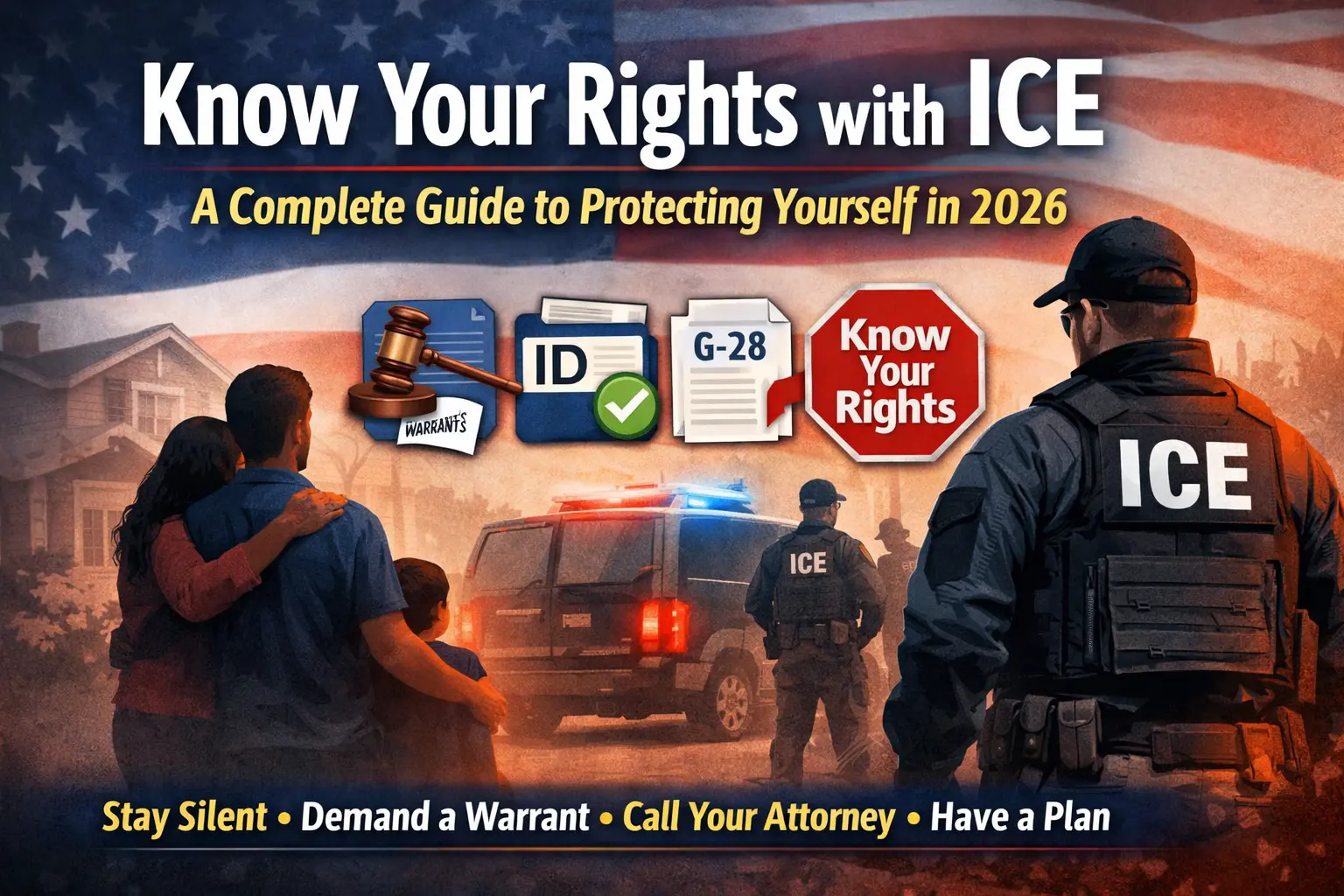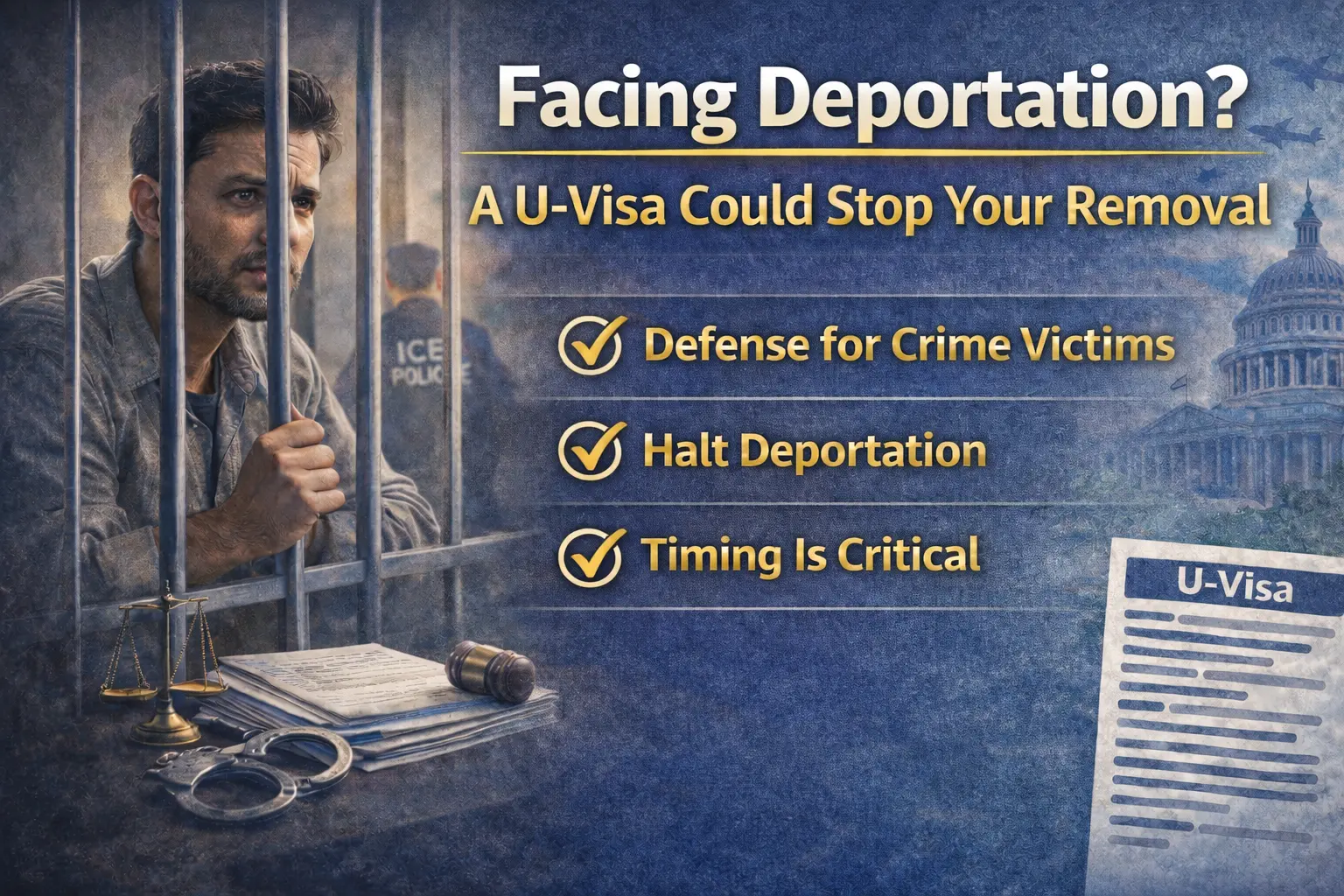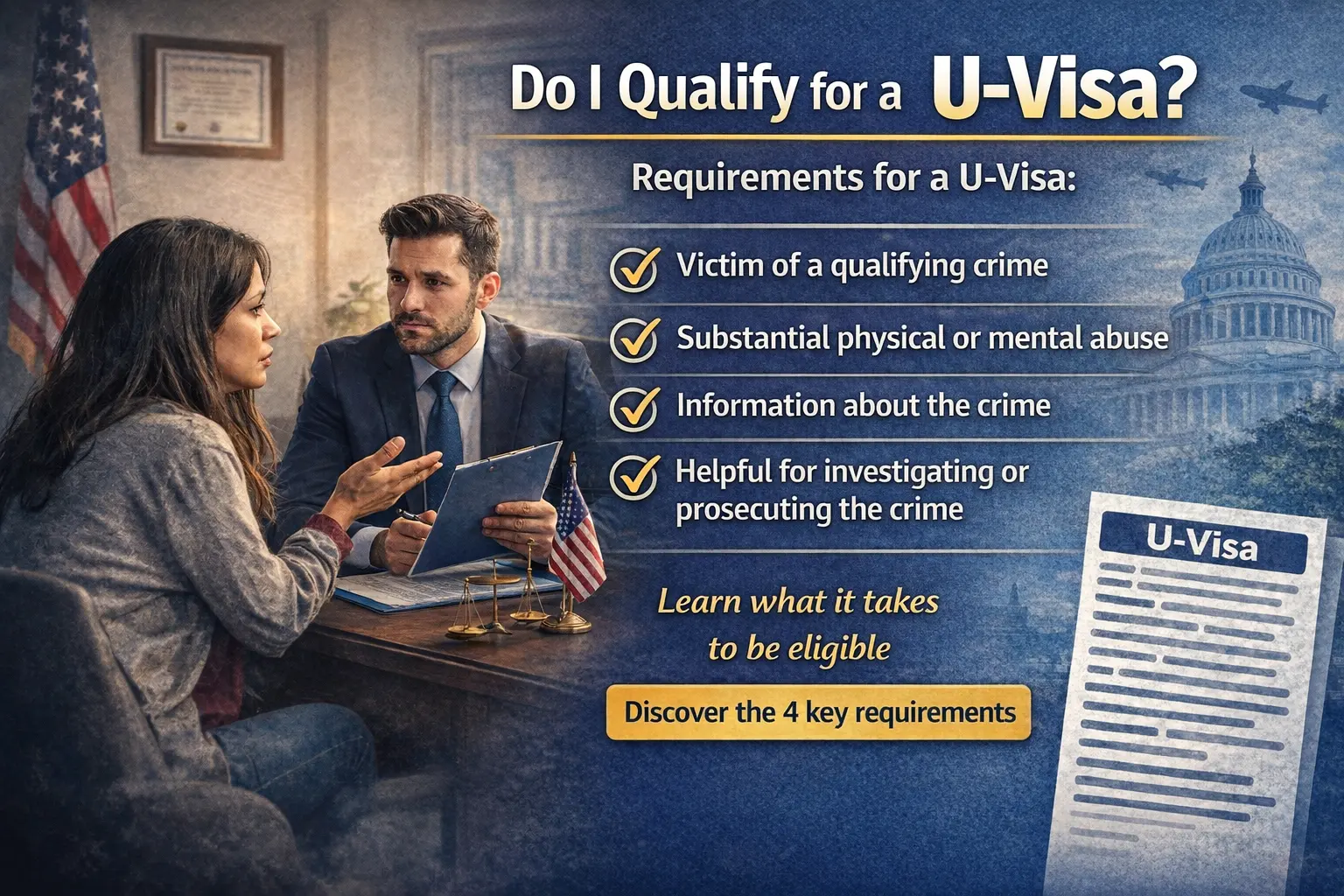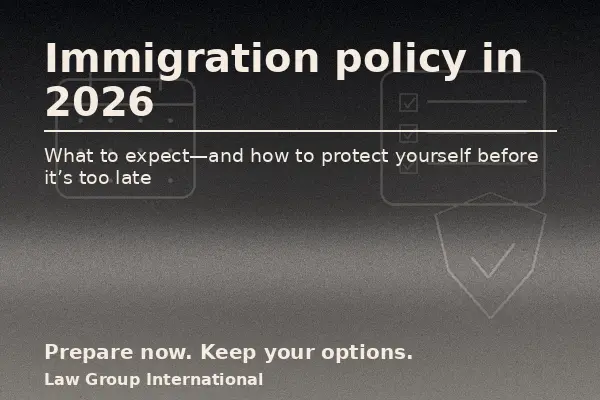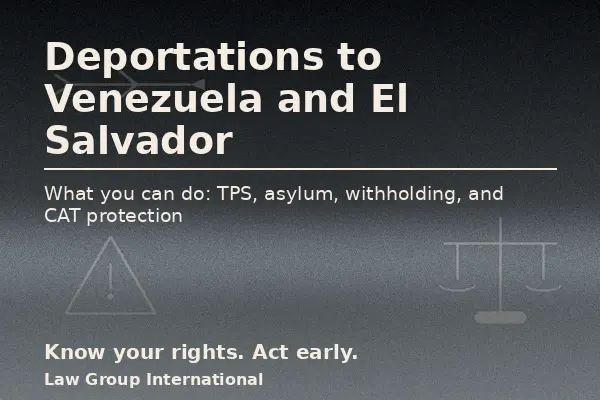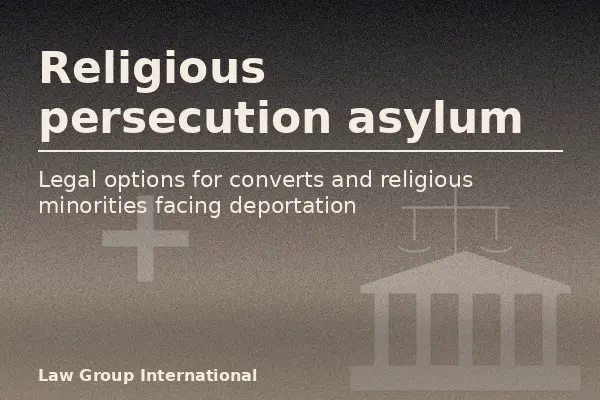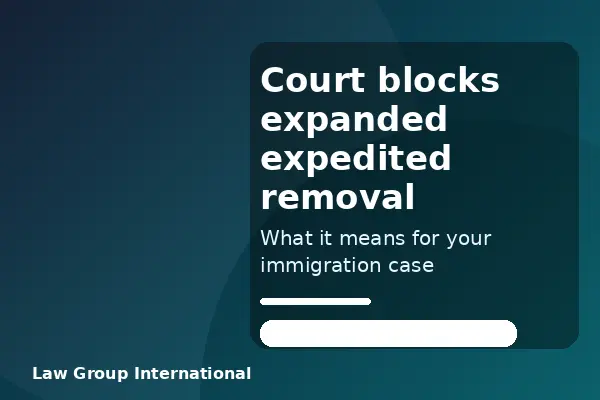Waivers that Matter in Court (212(h), 212(c), 237(a)(1)(H)): When and How They Help
Facing removal proceedings can feel overwhelming, especially when a past conviction or a mistake at the time of your admission threatens your ability to stay in the United States. Fortunately, several legal waivers under the Immigration and Nationality Act (INA) can forgive specific violations and give you a second chance.
At Law Group International, our deportation defense attorneys guide clients through the complex process of requesting waivers in immigration court. We help you understand which waivers apply to your case, how to prove eligibility, and how to build the strongest possible discretionary argument before the immigration judge.
- INA §212(h) can forgive certain crime-based inadmissibility (CIMTs, prostitution-related offenses, or simple marijuana possession under 30 grams) if you prove extreme hardship to a qualifying relative or meet the 15-year rehabilitation requirement.
Note: In removal proceedings, 212(h) must be tied to an adjustment of status, it cannot be filed on its own (Matter of Rivas, BIA 2013). - INA §212(c) remains available for many immigrants with pre-April 1, 1997 plea agreements after INS v. St. Cyr and Matter of Abdelghany. This legacy waiver applies only in removal proceedings before an immigration judge.
- INA §237(a)(1)(H) waives fraud or misrepresentation at admission or adjustment for lawful permanent residents (LPRs) with a qualifying U.S. citizen or LPR relative. It’s a discretionary waiver without a hardship requirement, but it cannot erase later criminal deportability grounds.
Each waiver serves a specific purpose. The key to success is understanding when to use each one, and how to present persuasive evidence of rehabilitation, family ties, and discretion.
212(h): The Crime-Based Waiver (Paired with Adjustment of Status)
Eligibility at a Glance
The 212(h) waiver forgives certain criminal grounds of inadmissibility under INA §212(a)(2), including:
- Crimes involving moral turpitude (CIMTs)
- Multiple convictions with total sentences of 5+ years
- Prostitution-related offenses
- A single offense of simple possession of ≤30 grams of marijuana
It does not cover drug trafficking or most controlled-substance offenses.
There are two main paths to qualify:
- Rehabilitation route: The offense occurred more than 15 years ago, and you demonstrate rehabilitation and discretion.
- Hardship route: You show extreme hardship to a qualifying U.S. citizen or LPR spouse, parent, son, or daughter.
However, lawful permanent residents have added restrictions. If you were admitted as an LPR and later convicted of an aggravated felony, or if you haven’t lived lawfully in the U.S. for seven years before proceedings began, you are barred from 212(h).
(LPRs who adjusted status rather than being “admitted” may avoid this bar under Matter of J-H-J-.)
Procedural Rule: No Stand-Alone 212(h)
In immigration court, 212(h) must be filed together with an adjustment of status (Form I-485). The Board of Immigration Appeals (BIA) explicitly prohibits filing 212(h) by itself.
Evidence Plan
- Extreme Hardship Packet: Follow the USCIS Policy Manual, Vol. 9, Part B, include medical, psychological, educational, financial, and country-conditions evidence, all tied to your qualifying relative.
- Rehabilitation Proof: Substance treatment completion, sobriety monitoring, certificates, therapy letters, and community service.
- Certified Records: Include court dispositions showing the offense is one that 212(h) can waive (for example, simple marijuana possession under 30 grams).
Judges will focus on:
- Whether the crime is actually waivable
- The strength of your hardship or rehabilitation evidence
- Whether you’ve shown genuine reform and positive community impact
Balancing positive and negative factors under Matter of Marin and Matter of C-V-T- is critical to winning discretion.
212(c): The Legacy Waiver That Still Saves Cases
Who Qualifies
Despite being repealed in 1996, 212(c) remains available to many immigrants whose convictions stem from plea agreements made before April 1, 1997. Following Matter of Abdelghany (BIA 2014), eligibility expanded. Applicants no longer need a “statutory counterpart” between deportability and inadmissibility grounds.
If you’re already in removal proceedings, you apply in immigration court, not through USCIS. (Form I-191 is used only for those outside proceedings.)
(Findlaw Statutory Reference)
Evidence Plan
To win a 212(c) waiver, you must prove:
- Lawful permanent residence
- Seven years of lawful domicile (as required pre-repeal)
- Favorable discretion
Strong evidence includes:
- Family unity and long residence
- Work history and tax compliance
- Education and rehabilitation
- Community involvement and good moral character
Judges evaluate these factors using Matter of Marin and Matter of C-V-T-. The goal is to prove that, despite past mistakes, your life now reflects responsibility, rehabilitation, and deep ties to the U.S.
237(a)(1)(H): The Fraud and Misrepresentation Waiver
Who It Helps
INA §237(a)(1)(H) forgives fraud or willful misrepresentation at the time of admission or adjustment, such as using false documents or failing to disclose key facts.
It applies to LPRs (including those who adjusted inside the U.S.) who have a U.S. citizen or LPR spouse, parent, or child, or are VAWA self-petitioners. It can also cover document-related violations tied to that fraud under INA §212(a)(7)(A).
Key Limits
- There’s no statutory hardship test, but judges still consider hardship and equities under discretion.
- It cannot waive independent deportability for crimes such as CIMTs under §237(a)(2)(A)(i).
Evidence Plan
- Proof of qualifying relative (marriage, birth, or parent-child documentation).
- Evidence that, aside from the fraud, you are “otherwise admissible.” This means clearing any other unwaived grounds of removability.
- Discretion evidence: length of residence, work and tax history, rehabilitation, community service, and proof of family unity.
Judges often look for evidence that the applicant acted in good faith after the misrepresentation and has since contributed positively to the community. (Matter of Agour confirms that adjustment counts as an “admission” for this waiver.)
Stacking and Sequencing: Using Waivers Together
Strategic planning can make a decisive difference in complex cases:
- 212(h) + Adjustment: Always pair together in removal proceedings — never file 212(h) alone.
- 237(a)(1)(H) + LPR Cancellation: Winning the fraud waiver can “cure” the admission problem, restoring eligibility for LPR cancellation under 240A(a).
- 212(c) vs. 240A(a): For older convictions, 212(c) may be safer than LPR cancellation because it avoids aggravated felony and stop-time issues.
What to File (Checklist)
212(h):
- Form I-485 (Adjustment of Status)
- Identity and status documents
- Certified court dispositions
- Hardship evidence (medical, psychological, school, financial)
- Rehabilitation proof and letters of support
- Tax filings and police clearances
212(c):
- Proof of LPR status and domicile timeline
- Certified plea and conviction records
- Family and community evidence
- Work and tax records
- Rehabilitation documentation
237(a)(1)(H):
- LPR proof and qualifying relative documentation
- Admission or adjustment records (I-130, I-485, I-551)
- Fraud explanation and supporting exhibits
- “Otherwise admissible” confirmation
Frequently Asked Questions
Can I file 212(h) by itself in court?
No. The BIA has ruled that 212(h) cannot be filed on its own in removal proceedings; it must be paired with adjustment of status.
Does 237(a)(1)(H) require hardship?
No statutory hardship test exists, but showing hardship supports discretion.
Is 212(c) still valid?
Yes. For many with pre – April 1, 1997 plea deals, thanks to Matter of Abdelghany.
Who counts as a qualifying relative for 212(h)?
A U.S. citizen or LPR spouse, parent, son, or daughter (children qualify).
Can 237(a)(1)(H) erase a criminal deportation charge?
No. It only forgives fraud or misrepresentation at admission or adjustment — not separate criminal grounds.
Talk to a Deportation Defense Attorney
Each waiver comes with unique rules, timing issues, and proof standards. A small procedural error can cost you eligibility, or your chance to stay in the U.S.
Our deportation defense service includes:
- Assess which waiver (or combination) fits your case
- Prepare detailed hardship and discretion packages
- File EOIR-compliant exhibits and forms on time
- Represent clients before the Annandale (VA) and Hyattsville (MD) Immigration Courts, and the BIA
If you face removal based on criminal or fraud grounds, we can help you understand your options and fight for your right to remain in the U.S.
Explore More Immigration Topics
Know Your Rights with ICE: A Complete Guide
February 17, 2026
VAWA Immigration: Protection for Victims of Domestic Violence
January 28, 2026
U-Visa and Deportation: How This Visa Can Save Your Case
January 19, 2026
U-Visa requirements 2026: Complete eligibility guide
January 13, 2026
Immigration Policy in 2026
January 1, 2026
Deportations to Venezuela and El Salvador
December 31, 2025
Religious Persecution Asylum
December 30, 2025
Northern Virginia Immigration Court
December 20, 2025
Federal Court Blocks Expanded Rapid Deportations
December 16, 2025

